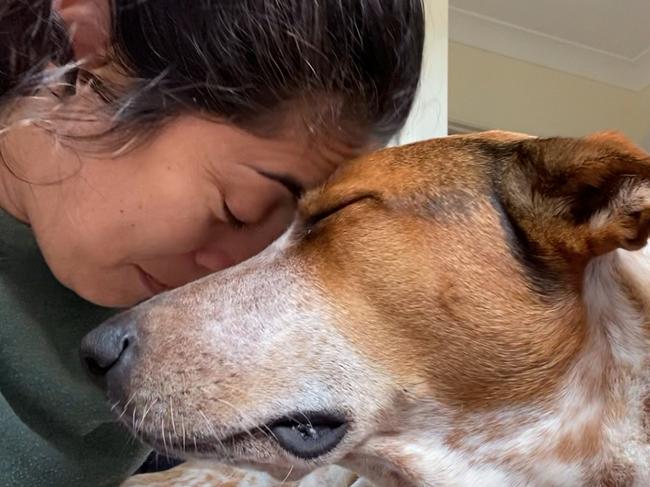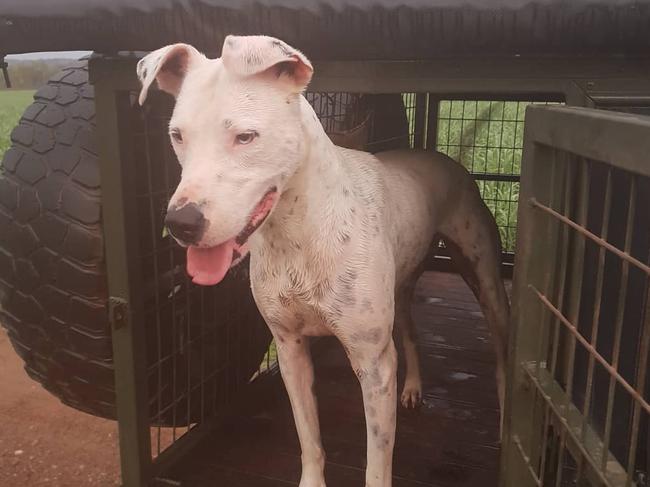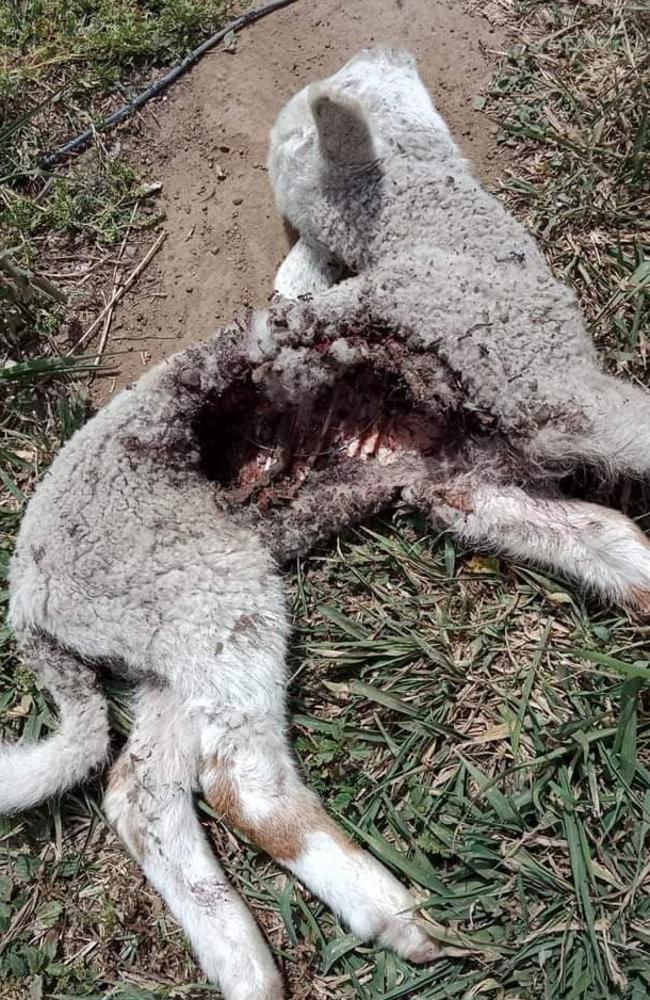Suspected baiting as four pets from same road die within days of each other
Four pets within one community have died agonising deaths within days of each other, in what’s suspected to be 1080 poisoning. WARNING: Distressing images and video
Vomit has been collected for testing after four pets on the same road died within days of each other from suspected 1080 poisoning in the Whitsundays.
An official from the Queensland Public Health unit collected samples of frozen vomit from two different dogs in the Sugarloaf community, near Airlie Beach, on September 27 as the family pets had already died convulsing in their owners arms.
The deaths of the dogs and two goats occurred within the same few weeks that nine other pets were killed from confirmed or suspected 1080 baiting in other parts of Queensland.
Darren Foster, 52, said his beloved red cattle dog cross, Kobi, and the other three pets from nearby Sugarloaf homes suddenly died in a five-day period in late August.
“Four animals within 150 metres of each other died and two vets are 95 per cent positive it was from 1080 poisoning,” he said.

All of the affected property owners, who live on five acre blocks, said they did not receive a letterbox notification nor were there any warning signs posted saying the toxic bait was being used in the area, as is required under Queensland legalisation.
“If someone can now readily get hold of a product that you’re supposed to have permits for … anyone can just grab handfuls of this stuff and kill animals,” one of the residents said.
Sodium fluoroacetate, commonly known by its brand name of 1080, is a highly toxic pesticide injected into meat and used by the government and private landholders to kill introduced “pest animals” such as feral dogs, foxes, cats, rabbits, pigs, and in some cases, dingoes and native wildlife.
A permit is required to buy and use 1080 and some of the other S7-scheduled poisons but there is confusion, even in government departments, over whether or not certain types of pre-made 1080 baits can be bought without a permit.
Many proponents of the bait state 1080 is essential for farmers to protect their livestock from being mauled by wild dogs, and that it is safe for most native animals.
FIVE DOGS DEAD IN FIVE HOURS FROM SUSPECTED BAITING
GRIEVING PET OWNERS WANT BAITING PROGRAM BANNED
Mr Foster said Kobi, 4, was asleep in the house when he and his wife Kay went to bed about 11.30pm on August 22.
He woke the family up about 2am crying and madly sprinting around the house in distress.
The couple rushed the 35kg dog to a Proserpine vet but he died five minutes after the on-call vet arrived.
Kobi had had several seizures on the way.
“He died with me holding him on the street,” Mr Foster said.
“My wife is absolutely distraught … I would never wish it on anybody and to be honest I don’t think I would even wish it on pest animals after watching the way Kobi died.
“Spend the time and money and go and shoot (pest animals) if you need to remove them, don’t use poison. This is no way for an animal to die.”
Another neighbour, who asked to only be known as Mr Davis, said he had worked with 1080-injected baits on properties years ago so immediately knew what was happening when he heard his dog Mitzy thrashing around in her pen.
“I could hear bang, bang, bang on the cage. I knew instantly it was 1080 and she was having a fit in the cage,” he said.

Mr Davis said a gate to his Sugarloaf home had been left open, which he only discovered the next morning after the six-year-old bull terrier greyhound cross disappeared.
The commotion started a few hours after Mitzy had returned and been locked in her pen.
Mr Davis rushed his frenzied, petrified dog to the vet, but it was too late.
“I grabbed her and she started fitting again in my arms. I took her in and as soon as I laid down on the table she just went stiff as a board,” he said.
There is no antidote for 1080.
The owner of the two-year-old goats, who did not want to be identified, said the hand-reared family pets were spotted frothing at the mouth right before the family headed out for the day, their rigid bodies later found in the shed.
Mr Foster said he has since been told three other dogs in the area had died of suspected poisoning within the past 18 months.
“So that’s five different owners and seven different animals in the past 18 months, with no notifications or (bait warning) signs each time,” he said.
All of the residents said they were alarmed after being informed by government officials that pre-made baits containing 1080 could now be bought over the counter.

Whitsunday Regional Council Director of Community Services Julie Wright confirmed manufactured baits could be bought from rural supply stores.
“The use of manufactured products must follow the conditions set out on the product label. The label of that brand of pre-made bait also stipulates warning signs must be erected and neighbours must be notified,” she said.
Ms Wright said while the WRC ran an annual co-ordinated 1080 baiting program for feral animals, the council had not baited recently.
She said the Sugarloaf deaths were being investigated.
“Council understands the Queensland Public Health unit in Mackay are conducting the investigation,” she said.
While some of the grieving pet owners wonder if a bird picked up a bait from a property in the area and dropped it on their land, others wonder if it was a targeted attack.
A Queensland Police Service spokeswoman said police had been notified, but had not received any formal complaints.
“We had a phone call from a local vet last week who believes that she has been presented with several dogs that may have been baited,” she said.
CONFLICTING ADVICE AMONG REGULATORY AUTHORITIES
A spokeswoman for the Australian Pesticides and Veterinary Medicines Authority said 1080 was classified as a restricted chemical product.
“RCPs can only be supplied to persons who have completed relevant training and/or met other requirements, and are authorised to use the product under the laws of a state or territory,” she said.
A Biosecurity Queensland spokesman said 1080 could be supplied as prepared baits, manufactured baits or capsules for canid pest ejectors.
A 2017 Department of Agriculture and Fisheries Toxin 1080 guide states a concentrated form of the poison can be supplied by authorised government officers but cannot be supplied directly to the public.
Anyone wanting to obtain approvals to buy other versions of commercially manufactured 1080 baits has to apply through Queensland Health, the document states.
Repeated requests by The Courier-Mail to interview Deputy Premier and Health Minister Steven Miles – including about the status of a review into the poison he announced in 2019 – were declined with questions referred to a media unit.
A Queensland Health spokeswoman from that unit declined to answer several specific questions, instead repeating answers from a written statement previously sent to The Courier-Mail.
The spokeswoman said strict requirements existed for the use and placement of 1080 baits to ensure community safety and reduce the risk of accidental poisoning of “non-target” animals.
“The manufacture, supply and use of 1080 in Queensland is strictly regulated under the Health (Drugs and Poisons) Regulation 1996 (HDPR),” she wrote.
“1080 baits may only be purchased from licensed schedule 7 poison retailers and cannot be purchased by members of the public.”
HEARTWRENCHING MOMENT PUPPY REFUSES TO LEAVE GRAVE
EIGHT DOGS DEAD IN BRISBANE ATTACKS
But the HDPR, updated in December 2017, states some versions of the pre-made 1080 injected baits can be bought over the counter without an endorsement, a generic term used to describe either a permit for strychnine or an approval for 1080 or a newer poison called para-aminopropiophenone (PAPP).
“An endorsement is required for landholders to lawfully obtain, possess, use and dispose of poisons used for baiting, such as 1080, strychnine, and 4-aminopropriophenone (PAPP),” the document states.
“As a landholder, you are able to obtain, possess, use and dispose fresh or manufactured baits containing up to 0.03 per cent of 1080 provided by a local government officer who is an authorised person under the Biosecurity Act 2014.
“You do not need to complete an application form if you intend to only purchase and use approved manufactured baits containing 1080, however you are still required to comply with the APVMA approved label requirements.”

In October 2019, Mr Miles announced the state government would answer a call to review the 1080 exclusions zones and introduce community awareness programs.
The announcement followed a May 2019 petition submitted to parliament from Central Queensland residents calling for a review into the poisons after losing their pets.
A 2017 Biosecurity Queensland (BQ) publication states many mammals, birds and reptiles have developed a much higher tolerance to 1080 than introduced animals, due to their evolution with naturally occurring fluoroacetate in some native Australian plants.
A BQ spokesman said the use of 1080 in some conservation areas allows the continued survival of rare and threatened wildlife and assists in the reintroduction of species into areas where they have previously been locally extinct.
